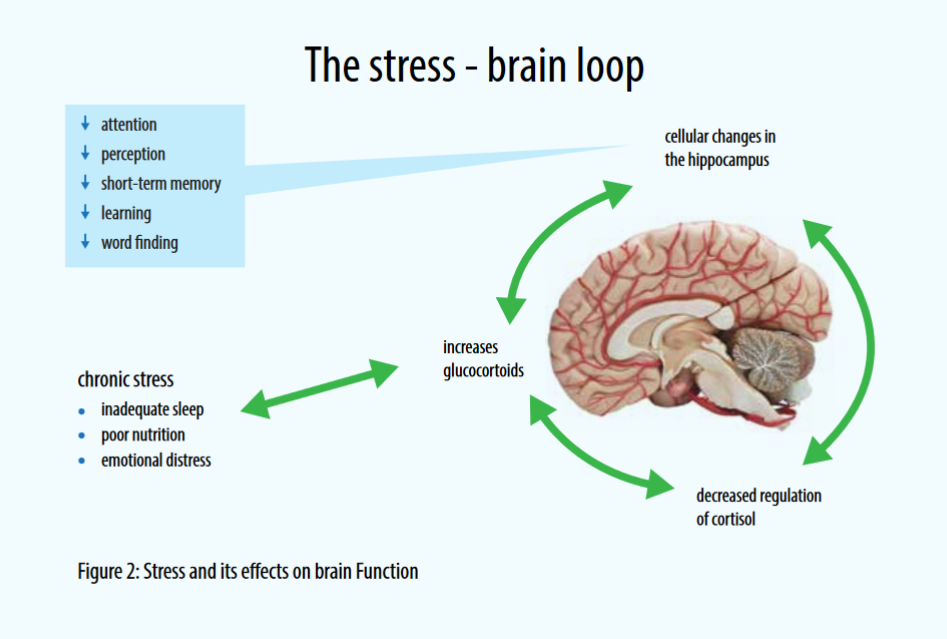Feeling tired, restless, and unable to sleep? You may be experiencing the effects of chronic stress on your sleep patterns. Chronic stress, that constant state of pressure and tension, can wreak havoc on your ability to get a good night’s rest. So, what exactly are the effects of chronic stress on sleep? Let’s delve into the impact it has on our precious slumber.
When stress becomes a chronic companion, it can disrupt the delicate balance of our sleep-wake cycle. Our bodies are designed to enter a state of relaxation and restfulness as we prepare for sleep, but chronic stress can interfere with this process. It can lead to difficulties falling asleep, staying asleep, or experiencing restorative sleep. The effects of chronic stress on sleep can leave us feeling groggy, irritable, and unable to function at our best during the day. So, how exactly does chronic stress hijack our sleep patterns and what can we do about it? Let’s explore these questions and more in this article.
The Effects of Chronic Stress on Sleep
Chronic stress can have a significant impact on sleep quality and quantity. When we experience stress, our bodies release stress hormones like cortisol, which can interfere with the natural sleep-wake cycle. This can lead to difficulties falling asleep, staying asleep, and achieving deep, restorative sleep. In this article, we will explore the various effects of chronic stress on sleep and discuss strategies for improving sleep in the face of stress.
Impact on Sleep Quality
Chronic stress can disrupt the quality of our sleep in several ways. One of the main effects is an increase in arousal levels, making it difficult to relax and fall asleep. When our minds are preoccupied with worries and anxieties, it becomes challenging to quiet the thoughts and calm the body for sleep. Additionally, stress can lead to the development of sleep disorders such as insomnia, where individuals struggle to initiate or maintain sleep.
Another effect of chronic stress on sleep quality is the disruption of the sleep stages. During a normal sleep cycle, we go through different stages, including deep, restorative sleep and rapid eye movement (REM) sleep, which is important for cognitive function and emotional well-being. However, stress can cause disturbances in these sleep stages, resulting in a fragmented and less restful sleep experience.
Increased Risk of Insomnia
Insomnia is a common sleep disorder that is closely linked to chronic stress. Individuals with chronic stress often experience difficulty falling asleep, staying asleep throughout the night, or waking up too early and being unable to go back to sleep. This persistent sleep disturbance can lead to daytime fatigue, irritability, and difficulties with concentration and memory.
The relationship between chronic stress and insomnia is bidirectional, meaning that stress can contribute to the development of insomnia, and in turn, insomnia can exacerbate stress levels. It becomes a vicious cycle where stress disrupts sleep, and poor sleep further intensifies stress levels, creating a negative feedback loop.
Disruption of Sleep Architecture
Chronic stress can also affect the overall structure of our sleep, altering the distribution of sleep stages throughout the night. Normally, we cycle through different sleep stages, with each stage serving a specific function in our physical and mental restoration. However, under chronic stress, the balance of these sleep stages can be disrupted.
Research has shown that stress can lead to a reduction in slow-wave sleep, which is the deepest and most restorative stage of sleep. Slow-wave sleep is essential for physical recovery, immune function, and memory consolidation. When this stage is compromised, individuals may wake up feeling unrefreshed and experience difficulties with cognitive tasks and emotional regulation.
Strategies for Improving Sleep in the Face of Stress
Fortunately, there are strategies that can help mitigate the effects of chronic stress on sleep. One of the most important steps is to practice stress management techniques, such as relaxation exercises, deep breathing, and mindfulness meditation. These techniques can help calm the mind and promote a state of relaxation, making it easier to fall asleep and stay asleep.
Establishing a consistent sleep routine can also be beneficial. Going to bed and waking up at the same time every day, even on weekends, helps regulate the body’s internal clock and promotes better sleep quality. Creating a soothing sleep environment, free from distractions and conducive to relaxation, can further enhance sleep.
Engaging in regular physical activity during the day can help reduce stress levels and promote better sleep. However, it’s important to avoid vigorous exercise close to bedtime, as it can increase alertness and make it more challenging to wind down.
In addition to these strategies, it’s crucial to prioritize self-care and make time for activities that promote relaxation and stress reduction. This may include hobbies, spending time with loved ones, or engaging in activities that bring joy and fulfillment.
By implementing these strategies and prioritizing sleep in the face of chronic stress, individuals can improve their sleep quality, restore their energy levels, and better manage the challenges of daily life. Remember, addressing chronic stress and its impact on sleep is a vital step towards overall well-being and optimal functioning.
Key Takeaways: Effects of Chronic Stress on Sleep
- Chronic stress can disrupt your sleep patterns.
- It can make it difficult to fall asleep or stay asleep throughout the night.
- Stress can lead to increased levels of anxiety, which can further impact sleep quality.
- Sleep disturbances caused by chronic stress can result in daytime fatigue and decreased concentration.
- Managing stress through relaxation techniques, exercise, and a healthy lifestyle can help improve sleep.
Frequently Asked Questions
How does chronic stress affect sleep?
Chronic stress can have a significant impact on sleep quality and duration. When we experience stress, our bodies release stress hormones such as cortisol, which can disrupt the normal sleep-wake cycle. This can lead to difficulty falling asleep, staying asleep, and achieving deep, restorative sleep. Additionally, chronic stress can contribute to the development of insomnia, a sleep disorder characterized by persistent difficulty falling or staying asleep.
Furthermore, chronic stress can also exacerbate existing sleep disorders, such as sleep apnea or restless legs syndrome. These conditions can cause disruptions in breathing or movement during sleep, further compromising sleep quality. Overall, the effects of chronic stress on sleep can result in daytime fatigue, decreased cognitive function, and increased risk of developing mental health issues.
What are the psychological effects of chronic stress on sleep?
Psychological effects of chronic stress on sleep can be wide-ranging. Firstly, chronic stress can lead to increased levels of anxiety and depression, which can disrupt sleep patterns. Anxious thoughts and worries can make it difficult to relax and fall asleep, while depression can cause excessive daytime sleepiness and disturbances in sleep architecture.
In addition, chronic stress can also contribute to the development of sleep disorders such as insomnia. The constant activation of the body’s stress response system can create a hyperarousal state that makes it challenging to calm the mind and achieve restful sleep. This can further perpetuate the cycle of stress and sleep disturbances, leading to a negative impact on overall mental well-being.
How does chronic stress affect REM sleep?
Chronic stress can disrupt the normal pattern of REM (rapid eye movement) sleep, which is a crucial stage of the sleep cycle associated with dreaming and cognitive processing. Stress can lead to decreased REM sleep duration and increased REM sleep latency, meaning it takes longer to enter this important stage of sleep.
Moreover, chronic stress can also affect the quality of REM sleep. Stress hormones like cortisol can interfere with the brain’s ability to regulate REM sleep, resulting in fragmented or shallow REM sleep. This can impact memory consolidation, emotional regulation, and overall cognitive function. As a result, individuals experiencing chronic stress may find themselves feeling groggy, irritable, and mentally foggy during the day.
Can chronic stress cause sleep disorders?
Yes, chronic stress can contribute to the development of sleep disorders. One of the most common sleep disorders associated with chronic stress is insomnia. Insomnia is characterized by difficulty falling asleep, staying asleep, or experiencing non-restorative sleep. The constant activation of the body’s stress response system can create a hyperarousal state, making it challenging to relax and initiate sleep.
Furthermore, chronic stress can worsen existing sleep disorders such as sleep apnea or restless legs syndrome. These conditions can cause disruptions in breathing or movement during sleep, leading to frequent awakenings and poor sleep quality. It is essential to address and manage chronic stress to prevent the onset or worsening of sleep disorders.
How can chronic stress-related sleep disturbances be managed?
Managing chronic stress-related sleep disturbances requires a holistic approach that addresses both the underlying stress and sleep issues. Firstly, adopting stress management techniques such as relaxation exercises, deep breathing, and mindfulness meditation can help reduce overall stress levels and promote better sleep.
Establishing a consistent sleep routine and creating a sleep-friendly environment can also aid in managing chronic stress-related sleep disturbances. This includes setting a regular bedtime and wake-up time, avoiding stimulating activities before bed, and ensuring a comfortable sleep environment free from distractions.
If sleep disturbances persist despite self-help strategies, it is advisable to seek professional help from a healthcare provider or sleep specialist. They can provide further guidance and recommend appropriate interventions, such as cognitive-behavioral therapy for insomnia (CBT-I) or medication, to help manage chronic stress-related sleep disturbances effectively.
Explained: How Stress Affects Your Sleep
Final Summary: The Impact of Chronic Stress on Sleep
After delving into the effects of chronic stress on sleep, it is clear that stress can have a significant impact on our ability to get a good night’s rest. From tossing and turning to difficulty falling asleep, chronic stress can wreak havoc on our sleep patterns. It disrupts the delicate balance of our body’s internal systems, leading to restless nights and groggy mornings.
One of the primary effects of chronic stress on sleep is the activation of the body’s stress response system, which releases hormones like cortisol that keep us alert and on edge. This heightened state of arousal can make it challenging to wind down and relax when it’s time for bed. Additionally, the constant worry and racing thoughts associated with chronic stress can keep our minds racing, making it difficult to quiet our thoughts and achieve a peaceful slumber.
Furthermore, chronic stress can also lead to the development of sleep disorders such as insomnia, sleep apnea, or restless leg syndrome. These conditions further exacerbate the already disrupted sleep patterns caused by stress, creating a vicious cycle of sleep deprivation and heightened stress levels.
In conclusion, chronic stress and sleep disturbances go hand in hand. The impact of stress on our sleep is undeniable, affecting both the quantity and quality of our rest. It is crucial to prioritize stress management techniques, such as relaxation exercises, mindfulness, and seeking support when needed, to promote better sleep and overall well-being. By addressing chronic stress, we can restore balance to our sleep patterns and wake up feeling refreshed and rejuvenated.



